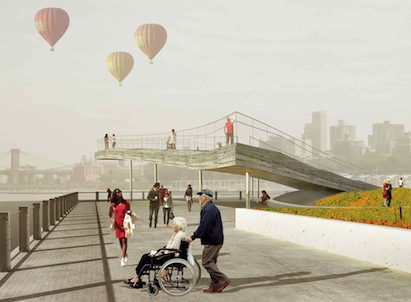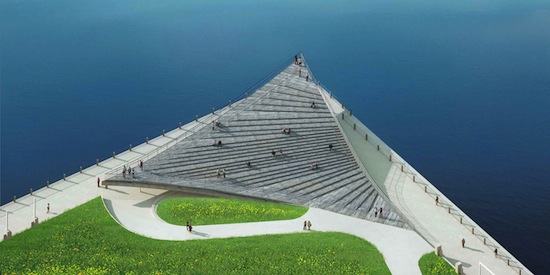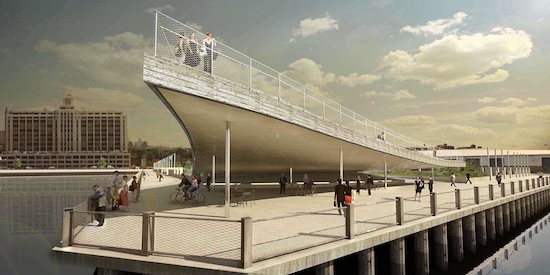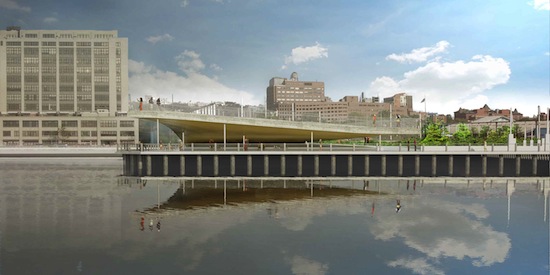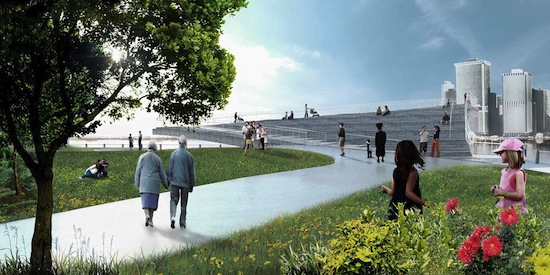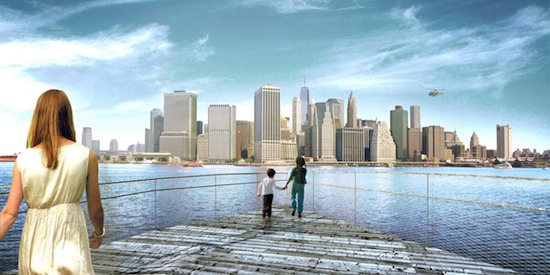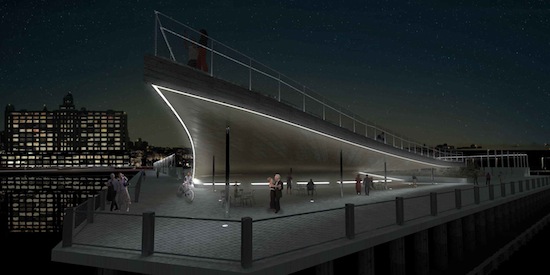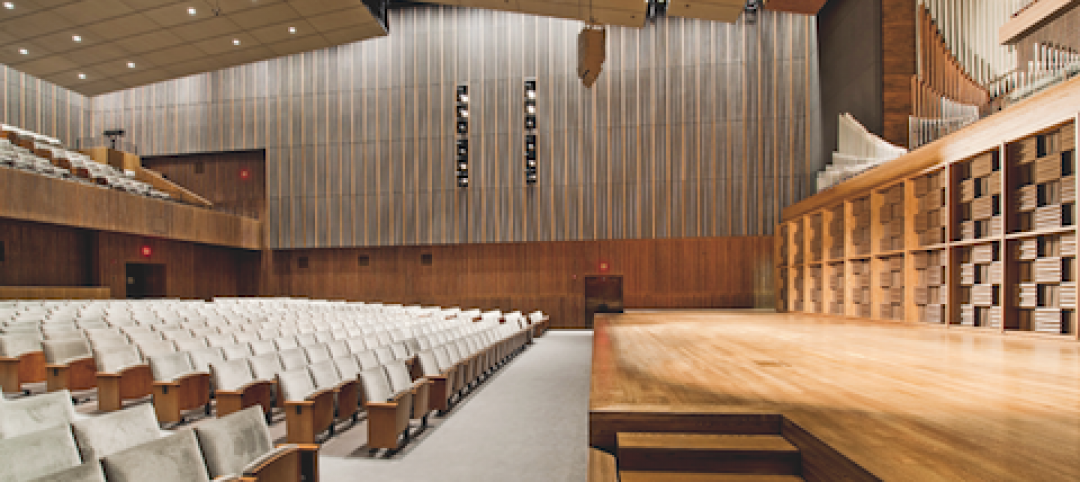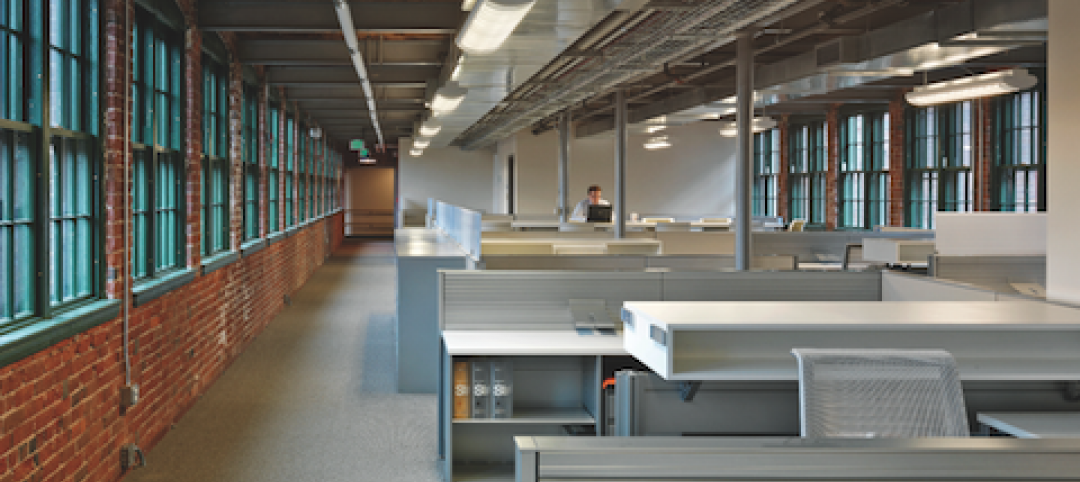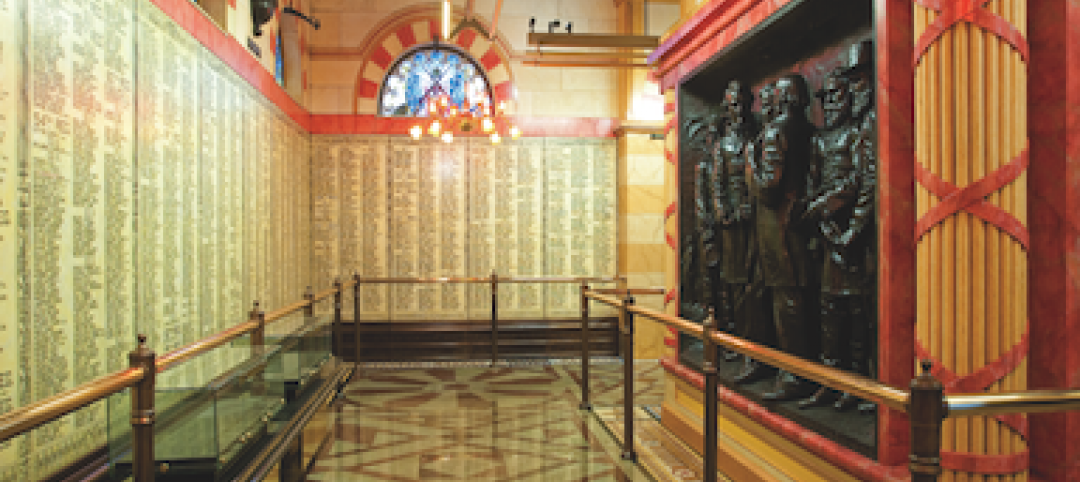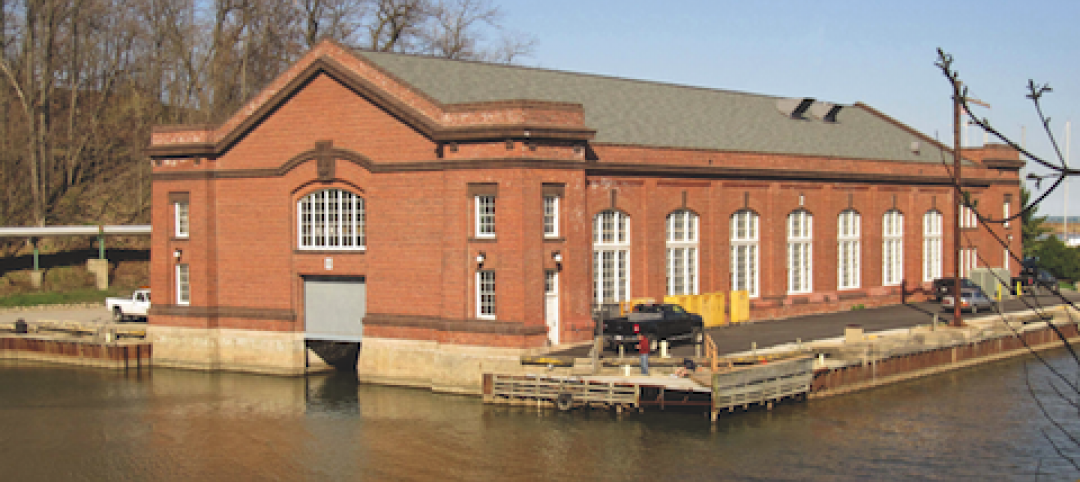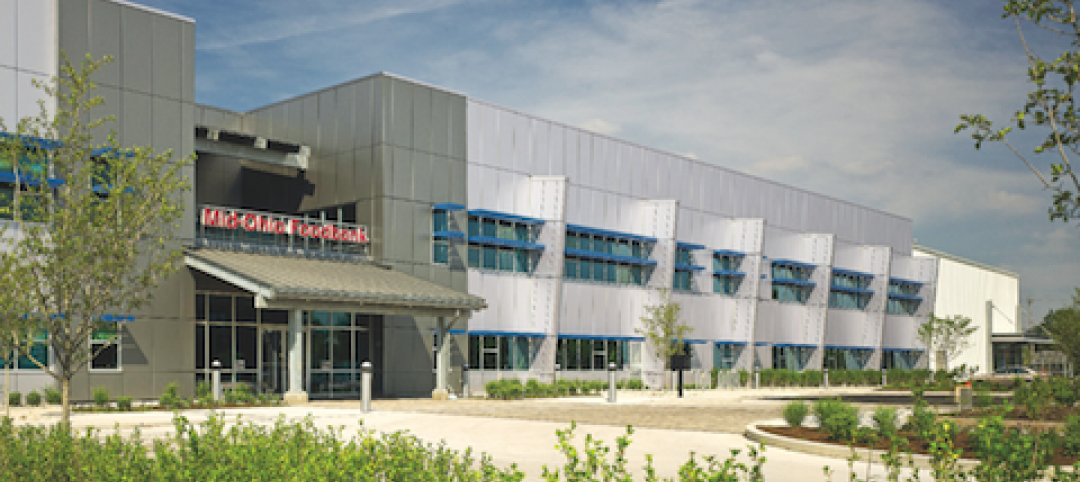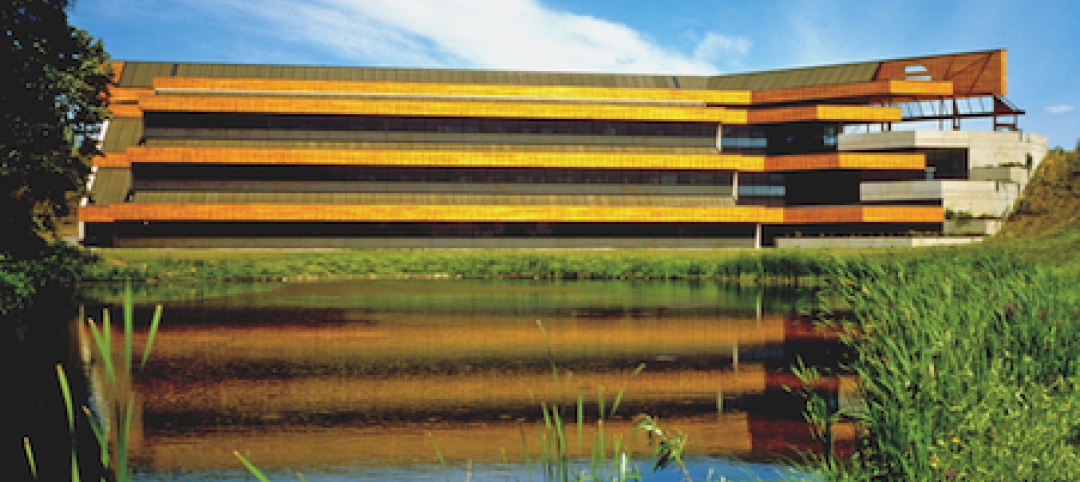BIG’s proposal for Brooklyn Bridge Park, a project that has revitalized the New York City waterfront, consists of a 6,000 ft2 (560 m2) triangular cross-laminated timber structure, serving both as pavilion and platform. Sloping upwards 17.5 feet (5.3 m) in height from the foot of the large gathering lawn, the platform provides magnificent views of the surrounding harbor, the Statue of Liberty, the Manhattan skyline, and the Brooklyn Bridge. In conjunction with the adjacent greenery, Pier 6 will be dominated by a flower field and treed areas giving the area seasonal displays of color.
The surface of terraced stairs, softly illuminated, will allow for large and small events and is fully ADA accessible. The pavilion, supported by thin steel columns, is brightly lit with up-lights and provides shade, shelter and space for indoor activities. Movable site furniture underneath the platform will accommodate a variety of programs, from food carts and picnicking to community events and small performances.
Bjarke Ingels comments: “The Mantaray is a small public platform at the end of the pier - equally accessible above and below. Its namesake organic slopes and curves have been shaped by concerns for accessibility, safety, shelter, structure - like a manmade reef evolved to accommodate human life.”
“This spectacular structure will provide much-needed shade and a unique space for public events, while offering a dramatic ascent to the water’s edge,” said Regina Myer, President of Brooklyn Bridge Park. “We are so pleased with the collaboration between Michael Van Valkenburgh’s landscape design for the southern portion of the park, and Bjarke Ingels’ design for a breathtaking architectural addition that provides a truly special moment on the waterfront.”
BIG was selected as winner of the project in Spring 2013. The collaboration between MVVA and BIG has evolved into a fruitful partnership where pavilion and landscape design inform and inspire each other. The project won the unanimous approval of the Community Board’s executive committee, as well as from the city’s Public Design Commission.
About Pier 6
Pier 6, located at the intersection of Furman Street and Atlantic Avenue, spans over 1.6 acres (6500 m2) and offers a diverse array of amenities, including sand volleyball courts, concessionaires, themed playgrounds, a dog run, plantings, and the seasonal Governor’s Island Ferry connecting Brooklyn and Governors Island.
About BIG
BIG – Bjarke Ingels Group is a leading international partnership of architects, designers, builders and thinkers operating within the fields of architecture, urbanism, research and development. BIG is led by partners – Bjarke Ingels, Andreas Klok Pedersen, Finn Nørkjær, David Zahle, Jakob Lange, Thomas Christoffersen and Managing Partners, Sheela Maini Søgaard and Kai-Uwe Bergmann – with offices in Copenhagen and New York. In all our actions we try to move the focus from the little details to the BIG picture. www.big.dk
About MVVA
MVVA- Michael van Valkenburgh Associates is a landscape architecture firm that creates environmentally sustainable and experientially rich places across a wide range of landscape scales, from city to campus to garden. With offices in Brooklyn, New York, and Cambridge, Massachusetts, and a staff of 65, MVVA approaches design and planning as a creative collective. www.mvvainc.com
COLLABORATORS
Michael Van Valkenburgh Associates (Landscape Design), Knippers Helbig (Structure), Tilotson Design Associates (Lighting Design), AltieriSeborWieber (MEP), Pantocraft (Code), Formactiv (Expediter)
Related Stories
| Oct 12, 2010
University of Toledo, Memorial Field House
27th Annual Reconstruction Awards—Silver Award. Memorial Field House, once the lovely Collegiate Gothic (ca. 1933) centerpiece (along with neighboring University Hall) of the University of Toledo campus, took its share of abuse after a new athletic arena made it redundant, in 1976. The ultimate insult occurred when the ROTC used it as a paintball venue.
| Oct 12, 2010
Owen Hall, Michigan State University, East Lansing, Mich.
27th Annual Reconstruction Awards—Silver Award. Officials at Michigan State University’s East Lansing Campus were concerned that Owen Hall, a mid-20th-century residence facility, was no longer attracting much interest from its target audience, graduate and international students.
| Oct 12, 2010
Gartner Auditorium, Cleveland Museum of Art
27th Annual Reconstruction Awards—Silver Award. Gartner Auditorium was originally designed by Marcel Breuer and completed, in 1971, as part of his Education Wing at the Cleveland Museum of Art. Despite that lofty provenance, the Gartner was never a perfect music venue.
| Oct 12, 2010
Cell and Genome Sciences Building, Farmington, Conn.
27th Annual Reconstruction Awards—Silver Award. Administrators at the University of Connecticut Health Center in Farmington didn’t think much of the 1970s building they planned to turn into the school’s Cell and Genome Sciences Building. It’s not that the former toxicology research facility was in such terrible shape, but the 117,800-sf structure had almost no windows and its interior was dark and chopped up.
| Oct 12, 2010
The Watch Factory, Waltham, Mass.
27th Annual Reconstruction Awards — Gold Award. When the Boston Watch Company opened its factory in 1854 on the banks of the Charles River in Waltham, Mass., the area was far enough away from the dust, dirt, and grime of Boston to safely assemble delicate watch parts.
| Oct 12, 2010
Cuyahoga County Soldiers’ and Sailors’ Monument, Cleveland, Ohio
27th Annual Reconstruction Awards—Gold Award. The Cuyahoga County Soldiers’ and Sailors’ Monument was dedicated on the Fourth of July, 1894, to honor the memory of the more than 9,000 Cuyahoga County veterans of the Civil War.
| Oct 12, 2010
Building 13 Naval Station, Great Lakes, Ill.
27th Annual Reconstruction Awards—Gold Award. Designed by Chicago architect Jarvis Hunt and constructed in 1903, Building 13 is one of 39 structures within the Great Lakes Historic District at Naval Station Great Lakes, Ill.
| Oct 12, 2010
Full Steam Ahead for Sustainable Power Plant
An innovative restoration turns a historic but inoperable coal-burning steam plant into a modern, energy-efficient marvel at Duke University.
| Oct 12, 2010
From ‘Plain Box’ to Community Asset
The Mid-Ohio Foodbank helps provide 55,000 meals a day to the hungry. Who would guess that it was once a nondescript mattress factory?
| Oct 11, 2010
HGA wins 25-Year Award from AIA Minnesota
HGA Architects and Engineers won a 25-Year Award from AIA Minnesota for the Willow Lake Laboratory.


